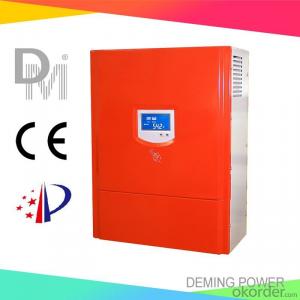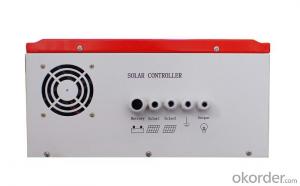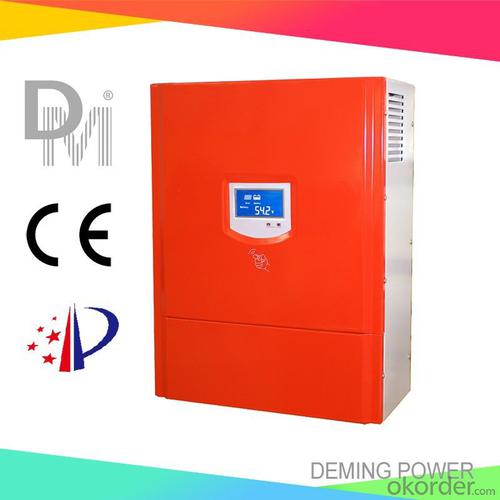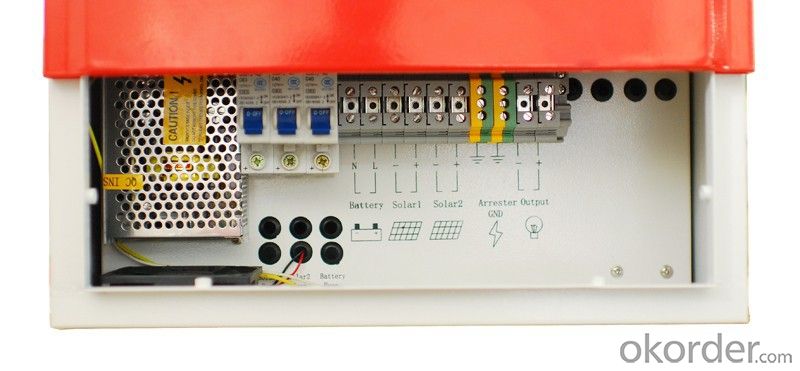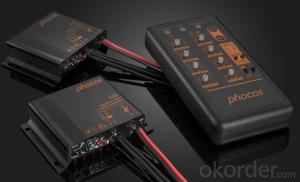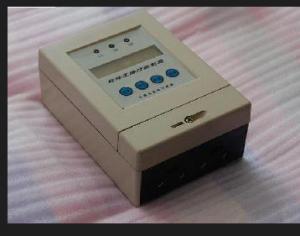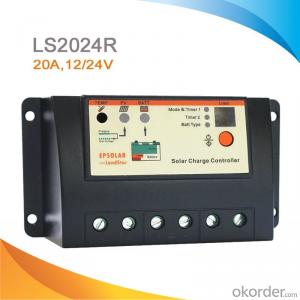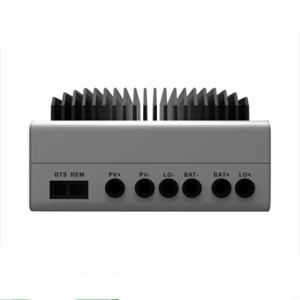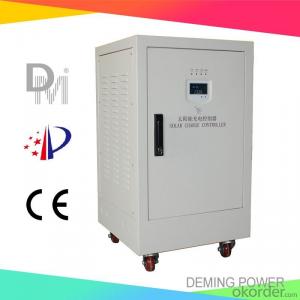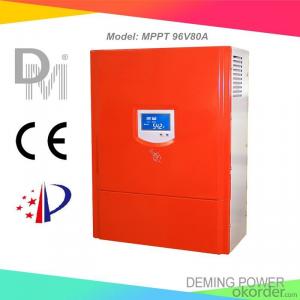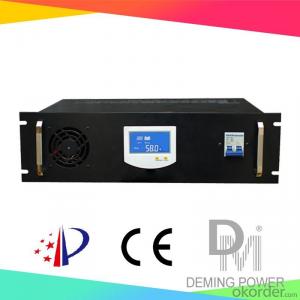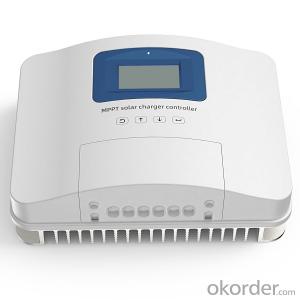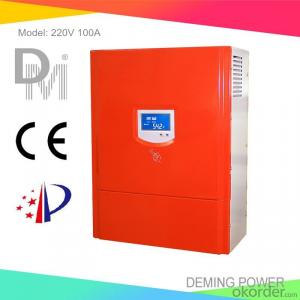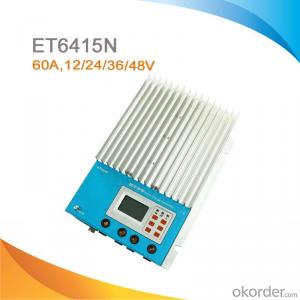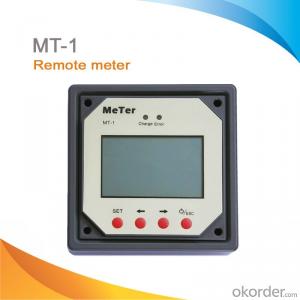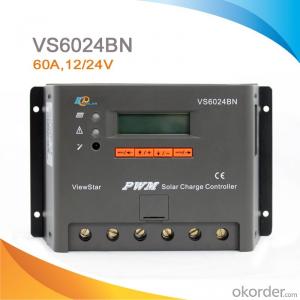Solar Panels and Controllers:MPPT Solar Charge Controller 96V 100A with Best Price for Solar Power System
- Loading Port:
- Qingdao
- Payment Terms:
- TT OR LC
- Min Order Qty:
- 1 PCS
- Supply Capability:
- 1000 PCS/month
OKorder Service Pledge
OKorder Financial Service
You Might Also Like
Properties of the solar charge controller
1. Design for off-grid solar power system.
2. Applicable to different kinds of batteries.
3. Adopts MPPT technology (Maximum Power Point Tracking). The advanced tracking algorithm make the solar module operate at ideal voltage which the solar modules can produce the maximum available power.
4. Modular design with simple structure and easy maintenance.
5. Automatic power control function.
6. LCD display: Solar panel current, solar panel voltage, solar panel power, battery group voltage, charge current.
7. Perfect protection function: Solar reverse charge protection, Solar reverse connection protection, Battery reverse connection protection, Battery overcharge protection, Battery over current protection etc ,thus the system has higher reliability.
Technical parameters of the solar charge controller
Model | 96V100A | |||||
Battery group rated voltage | 96Vdc | |||||
PV Rated current | 100A | |||||
PV open circuit voltage | 400V | |||||
PV Max. power | 9600Wp | |||||
Input PV module road number | 1 | |||||
Function | MPPT charge mode, auto stop charge, auto recharge voltage; Protection: connecting contrary, over current, short circuit, over heat etc. | |||||
Display mode | LCD | |||||
Display content | solar panel voltage, solar panel current, solar panel power, battery voltage, charge current | |||||
MPPT DC voltage range | 80-116Vdc | |||||
Floating Charge Voltage (adjustable) | 110Vdc | |||||
Stop charge voltage | 116Vdc±1% | |||||
Recharge voltage | 108V±1% | |||||
Voltage drop between PV and battery | 1.5V | |||||
Max itself power consumption | 100mA-150mA | |||||
Work environment temperature | -30-60°C | |||||
Relative humidity | 90% No condensation | |||||
Applicable altitude | 3000m The rated power should be reduced when it is higher than 2000m | |||||
Noise (1m) | 40dB | |||||
Degree of protection | IP20(Indoor) | |||||
Cooling method | Forced air cooling | |||||
*Communication interface (optional) | RS485/USB/GPRS/Ethernet | |||||
*Temperature compensation(optional) | -4mv/°C/2V,-35°C~+80°C,Accuracy:±1°C | |||||
Product size (mm) | 620*500*180mm | |||||
Product Weight(kg) | 32kg | |||||
*Above parameter only for reference. Could be custom made to user specifications.
- Q: Can a solar controller be used with a generator as a backup power source?
- Yes, a solar controller can be used with a generator as a backup power source. The solar controller regulates and manages the flow of energy from the solar panels to the battery bank. When the solar panels are not generating enough power, the solar controller can automatically switch to the generator as a backup source to charge the batteries. This ensures a continuous power supply even when solar energy is insufficient.
- Q: What is the maximum load current a solar controller can handle?
- The maximum load current a solar controller can handle varies depending on the specific model and its design specifications. It is important to consult the manufacturer's documentation or specifications sheet for accurate information on the maximum load current capacity of a particular solar controller.
- Q: Can a solar controller be used with a solar-powered weather station?
- Yes, a solar controller can be used with a solar-powered weather station. A solar controller helps regulate the charging and discharging of batteries in a solar system, ensuring efficient and safe operation. It can effectively manage the energy generated by the solar panels and supply power to the weather station while also storing excess energy for use during cloudy or nighttime conditions.
- Q: What is the difference between a PWM solar controller and an MPPT solar controller?
- A PWM (Pulse Width Modulation) solar controller and an MPPT (Maximum Power Point Tracking) solar controller are both used in solar power systems to regulate the charging of batteries. The main difference between the two is in their charging efficiency and performance. A PWM solar controller works by rapidly switching the solar panel's output on and off to maintain a steady voltage for charging the battery. However, this method can result in energy loss and lower charging efficiency, especially in situations where the solar panel voltage is much higher than the battery voltage. On the other hand, an MPPT solar controller is designed to optimize the power output of the solar panel by dynamically adjusting the voltage and current to find the maximum power point. This allows the MPPT controller to efficiently convert and deliver more power to the battery, resulting in higher charging efficiency and better utilization of available solar energy. In summary, an MPPT solar controller is generally more advanced and efficient than a PWM solar controller, making it a preferred choice for maximizing the charging efficiency and performance of solar power systems.
- Q: Can a solar controller be used with a solar-powered trash compactor?
- Yes, a solar controller can be used with a solar-powered trash compactor. The solar controller is responsible for regulating the flow of solar energy from the solar panels to the trash compactor, ensuring efficient charging and operation of the system.
- Q: How does a solar controller handle power surges from the solar panels?
- A solar controller typically handles power surges from solar panels by using a built-in protection mechanism. This mechanism regulates the flow of electricity, preventing any excess power from reaching the batteries or other connected devices. It ensures that the voltage and current levels remain within safe limits, safeguarding the entire solar power system from potential damage caused by power surges.
- Q: Can a solar controller be used with solar-powered indoor hospitality facilities?
- Yes, a solar controller can be used with solar-powered indoor hospitality facilities. A solar controller is used to regulate and optimize the charging and discharging of batteries in a solar power system. It ensures that the batteries are charged efficiently and protected from overcharging or discharging. Therefore, it can be utilized in solar-powered indoor hospitality facilities to manage the power generated by solar panels and provide a stable and reliable source of electricity.
- Q: Can a solar controller be used with a solar grid-tied system?
- No, a solar controller is not necessary for a solar grid-tied system. In a grid-tied system, the solar panels are connected directly to the utility grid, and the power output is regulated by the grid-tie inverter. A solar controller is typically used in off-grid systems to regulate the charge and discharge of batteries, which are not present in a grid-tied system.
- Q: Can a solar controller be used with solar-powered electric vehicles?
- Yes, a solar controller can be used with solar-powered electric vehicles. A solar controller is responsible for regulating the flow of electricity from the solar panels to the battery, ensuring efficient charging. In solar-powered electric vehicles, the solar controller helps manage the energy generated by the solar panels and charges the vehicle's battery, thereby extending the range and reducing reliance on the grid for charging.
- Q: How does a solar controller prevent short circuits in the solar panel array?
- A solar controller prevents short circuits in the solar panel array by continuously monitoring the voltage and current flowing through the panels. It has built-in protection mechanisms such as overcurrent, overvoltage, and reverse current protection, which automatically shut off the circuit in case of any abnormal current flow or short circuit occurrence. Additionally, the controller regulates the charging process and ensures that the panels are operating within their safe limits, preventing any potential short circuits from damaging the panels or the entire array.
Send your message to us
Solar Panels and Controllers:MPPT Solar Charge Controller 96V 100A with Best Price for Solar Power System
- Loading Port:
- Qingdao
- Payment Terms:
- TT OR LC
- Min Order Qty:
- 1 PCS
- Supply Capability:
- 1000 PCS/month
OKorder Service Pledge
OKorder Financial Service
Similar products
Hot products
Hot Searches
Related keywords
